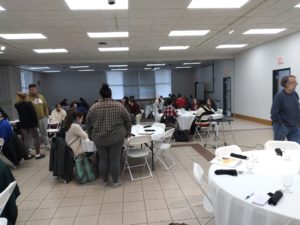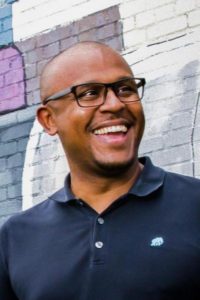
To celebrate Martin Luther King, Jr. Day Blackburn College hosted a luncheon at noon on Jan. 20. Staff, faculty, students and community members filled the rooms 100B and 100C in Woodson to eat and listen to the words of the speaker Larry D. Terry II. Many students also attended as part of an MLK Day Leadership Retreat.
Political Science Professor Dr. Laura Weidlocher opened the program with a welcome and explanation of events. Chair of Philosophy and Religion Dr. Carter Aikin prayed for the meal and the event that followed. After guests ate, Chair of Leadership, Law and Public Service Dr. Shelly Peffer introduced the speaker, her close friend Terry.

Guest speaker Larry Terry
Terry has previously worked at both the University of Arizona and the Long Island University in Brooklyn where he was Assistant Professor of Public Administration. He is now executive director at the Weldon Cooper Center for Public Service at the University of Virginia. There, he works to “inform public policy, develop public leaders, and deliver strategic and technical assistance” according to the Cooper Center website.
Terry started his talk titled “Leading with Humanity” with a story from his past. He found that his family history could be traced back to when his great great great great grandfather participated in the 1870 census as an undercook in the Civil War. Terry continued by showing a map made in 2010 by the Cooper Center that shows the US racial population in different colored dots. He praised participating in censuses as a vital part of participation in the government.
Terry believes that people should not just vote and participate in the census. He calls for more action and encourages people to get involved in things that “allow us to think beyond the bare minimum.” His speech inspires people to work with their communities for the betterment of the whole, not just the self.
As an example of how community betterment can be achieved, Terry brings up one of his past projects. While in Texas, he started the Community Leadership Academy where police worked with citizens to teach each other leadership skills. The officers were not allowed to wear badges and instead wore casual clothes. When the project ended police and citizens had grown to know and see each other as people, not police and non-police.
The luncheon served to inspire everyone to get involved with their communities and put in effort to improve them. More than that, it reminded attendees to connect with those around them and like Terry said, “believe in people more than anything else.”

